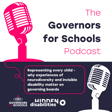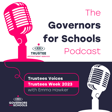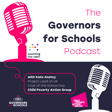Introduction to Podcast and Campaign
00:00:13
Speaker
Hello, everyone, and welcome to the Governors for Schools podcast. I'm Ashley, a Communication and Engagement Manager at Governors for Schools, and I'm delighted to be with you today for our newest episode. We're now four weeks into our Counting the Cost campaign, which aims to highlight how governors can support schools during the current cost of living crisis. With research from Strictly Education Commission for National School Governors Awareness Day 2023, shown that 91% of survey respondents had already discussed the cost of living crisis on their board this year,
00:00:43
Speaker
It's clear that cost of living is something on many school governors' minds.
Staffing Challenges and Wellbeing
00:00:48
Speaker
In last week's episode, we considered the costs affecting educational opportunities and learning. And this year at week, we're turning our topic to a very large and quite complex area of school life, staffing.
00:01:00
Speaker
We're going to be looking at retention efforts and wellbeing in the sector, as well as some common recruitment challenges that schools are facing right now. This is not a very small feat when you think budgets are tight and times are tough, but it's a really important conversation for us as governors to have.
00:01:16
Speaker
Before we jump in, I think it's important to take a moment to look at the backdrop of the conversation as well. Media coverage surrounding teachers' pay and work and conditions have certainly hit the headlines in recent months. Schools across the country have been affected by industrial action and increasing turnover rates. As a result, governors may find themselves navigating a rather difficult terrain as the cost of living crisis continues to grapple schools across the country.
00:01:41
Speaker
There's a lot to think about in this area, from issues around staff wellbeing, retention, recruitment, staff development, and a lot more. So we appreciate that when it comes to staffing, it can seem a little overwhelming. But the good news is to help us explore the staffing landscape, we've got a very special guest today on the Governors for Schools podcast. I'm delighted to be joined by Gemma Scottcher, Director of Communications and Public Affairs at Education Support. Gemma, welcome to the Governors for Schools podcast.
00:02:08
Speaker
Hello, Ashley. It's really nice to be here. Thank you for taking the time to join us today. And before we jump into some of the challenging questions at hand, I wonder if you could help our learners understand a little bit more about education support. What does education support do? Yeah, absolutely. So education support is the UK's only charity focused on the mental health and wellbeing of everyone working in education.
00:02:34
Speaker
We have been around for 145 years. And if you're wondering why you haven't heard of us, we used to be called the Teachers Benevolent Fund. And people always nod and go, oh, yes, I remember. But we're education support. We have been for a while. We have a range of services for teachers and education staff. We have a free helpline that you can call, 0800 562 561. You can call 24-7 and talk to a qualified counselor about whatever's going on for you.
00:03:03
Speaker
You may also be at a school that actually has an education support employee assistance program. And we also provide supervision for school leaders, professional supervision. We also have, which is very relevant to this conversation today, we have a grants program where we provide emergency short term financial support for people working in education as well. So we're very close to a lot of this.
00:03:33
Speaker
A lot of what's happening on the ground because of the cost of living and broader environmental stuff that's happening and how the workforce is doing generally.
Mental Health and Education Outcomes
00:03:42
Speaker
A difficult time indeed, but I think it's clear that your organisation and certainly governors for schools as well, we're very much rooted around helping the sector flourish and areas that we're focused in. Would you agree? Oh, absolutely, yeah. That's really what we're about. We believe that better mental health and wellbeing leads to better education.
00:04:02
Speaker
And, you know, we care about how the workforce is doing in and of itself because they're humans, they're people, they're working and their mental health matters. But also for the kind of broader social piece, you know, them doing their job well, feeling well.
00:04:21
Speaker
going into work every day feeling the best that they can be and doing the best job possible. That affects kids, the future generation, our nation generally. So it matters on an individual level and it really matters on a kind of bigger national social scale as well.
00:04:37
Speaker
Absolutely. And I think the cost of living crisis really is making it quite difficult for many schools to flourish right now. And I think the cost of living crisis, it's really compounded some of those issues we see around recruitment and retention. I'm wondering what role do you think charitable organisations such as ours play or should play in tackling this problem? Yeah. I mean, I think it's a big question and it's a big answer because I think we definitely have a role to play.
00:05:07
Speaker
not least because at the minute we're in a situation where public services are stretched in every direction, right? Yeah. Schools are really hoovering up. All that's left over are not being caught by the wider public services and particularly services for children and young people. There's so much need in the system. You know, poverty, mental health,
00:05:38
Speaker
send issues, all of that. It's showing up at schools every single day. And unfortunately, and we have some research coming out in May that will highlight this, staff are not necessarily able to get the support for kids that they want and need and deserve. And that's having such an impact on, you know, just the general wellbeing of staff, because we know that
00:06:07
Speaker
Education staff at all levels are driven by this kind of really strong moral sense of purpose. They want to do the best for the kids and not being able to get them, you know, whether it's a cams referral or a social worker or whatever.
00:06:23
Speaker
not being able to get that support in a timely fashion. It's having a massive effect on them. They're not switching off at night. They're carrying the weight of responsibility for how the kids are doing often. And I think that's massive. I think that's having a really big impact on how the workforce is
00:06:47
Speaker
experiencing working in education at the moment. So yeah, with public services at where they are at, there's a huge role, I think, for the charities, for organisations to do everything possible to try and get everyone through this period.
00:07:06
Speaker
I think the impact that the kind of cost of living crisis is having on well-being can't be understated, really.
Expanding Roles and Resource Constraints
00:07:12
Speaker
I was reading some research from the Teachers' Union, NASUWT, from September 2022. They'd surveyed 6,500 members, and 58% of those respondents had said that they'd had to give food or clothing to the peoples. And I just think the impact that that can have on well-being
00:07:33
Speaker
It's really difficult, isn't it? I think as governors it's important that we think about what we can really do to support our school communities during this time. Oh yeah, I mean that NASUWT research really echoes with some research we did. We launched our teacher retention commission back in December
00:07:53
Speaker
And we had some survey statistics that supported that. Forgive me, I've got no mind for numbers, but you can find it online. But you know, we had really big percentages of staff who were feeding kids, washing their uniforms, supporting the kids emotionally, supporting their colleagues emotionally.
00:08:16
Speaker
helping to resolve family conflicts, all of this stuff that is so much bigger and wider than what we traditionally consider to be the job of teaching and learning. And so it speaks to a kind of gradual expansion of the roles and responsibilities that education staff are dealing with. But there's no extra time in the day, you know, to cope with this scope creep. But they're taking it on nonetheless.
00:08:46
Speaker
And I think the other thing I just want to say is on the cost of living point is that's very real and it's showing up in all kinds of different ways, which I'm happy to talk about. But I think it's also bigger than that in the sense that if you think about the lifetime of, you know, a 16 year old in school, they've been schooled through austerity.
00:09:11
Speaker
the pandemic and now the fallout of the pandemic in the form of a cost of living crisis. That is an awful period to be in. Internally, at support, we refer to it as the austerity Covid sandwich.
00:09:30
Speaker
Awful, what an unappetizing sandwich. And so it is much, much bigger than just in this moment. The way that schools are operating at the moment, through no choice of their own, is the direct result of this sandwich effect of austerity and COVID.
00:09:49
Speaker
And the frontline people helping students navigate that sandwich are our school staff. So I think it's understandable that that would have an impact on retention. Yeah, exactly. I mean, just imagine, just think of any, you know,
00:10:05
Speaker
Any other kind of high stakes profession, people have professional pride and on a very basic rational level, wellbeing and everything aside, it's deeply frustrating to not do the job that you care about well because you haven't got the basic tools to do it well.
00:10:21
Speaker
How frustrating is that? But then there's so much more on top of it because education is such a deeply relational and personal mode of work. So you've got that basic frustration at not being able to do the job properly and then the emotional impact of the human cost of that as well. Do you think there are any other factors impact in retention as well as the current kind of cost of living crisis? There are a lot of things.
00:10:51
Speaker
whenever we ask, I mean, I think they're all related, right, to this broader context that we're talking about. But we often hear in our research and focus groups, you know, from teachers, we ask, if you could have one thing, what would it be? And they always say more time. And that's that's an obvious one, isn't it? Work and workload is directly related to that. Our teacher wellbeing index says that
00:11:18
Speaker
in our last one half of the workforce were actively seeking to look and of those like 68% said the workload was a reason but again that speaks to this timepiece doesn't it? I think there's something about moving with the times as well if I'm honest. Again what I've just described in terms of the breadth of work that teachers and education staff are doing, I don't think
00:11:46
Speaker
I don't think we've caught up with the reality of that and I think we often, schools are still structured in a way that thinks about education as standing at the front of the class delivering a lesson and obviously that's a massive part of what has to happen and does happen but it's not just that and we need to move with the times a little bit and I think think about a graduate who's
00:12:15
Speaker
University mates are working flexibly and dare I say it, paid more. You know, there's a lot to be said about moving with the times and flexibility is a big part of that, I think.
00:12:30
Speaker
There are some schools that are absolutely nailing this, you know, making sure that PPA time is at the front or the back end of the day so that people can, you know, flex that and pick up kids or be a person. I think there's a lot of knee-jerk fear of flexible working. But I think we know that there are schools that are doing it well, so how can we learn what that looks like?
00:12:54
Speaker
I think that's a key point for me and a key takeaway as a governor myself. It's knowing what good practice looks like and how in my own role as a governor, how we can adopt that good practice in our own school. And I think we can't be gatekeepers of good practice or information. We have to share that. And if something's working well in your local context,
00:13:14
Speaker
adopt that in other areas and see if anyone else can benefit from that as well. And I think you make a good point around kind of flexibility as well because I think historically maybe flexible working in an education system has been more uncommon. But I think the benefits that that can have to retention I think really could be quite important.
Retention and Diversity Issues
00:13:34
Speaker
I was quite alarmed actually by some research that I was reading from
00:13:39
Speaker
the NTMP project, which looked from 2018 to 2021 on education sector levers. And it said that the biggest group of people that were leaving education during that period were women aged 30 to 39. And I think that creates a real potential issue of diversity within the sector. We're losing potentially a big pool of people, aren't we? And that's a worry, I think, for schools across the country.
00:14:06
Speaker
That's big, and there's a lot to unpack in that. And immediately what I think is if we make the probably quite clumsy assumption, but I'm going to do it anyway, if we make the assumption that these are women who are potentially considering family life or starting families or already have them, and many of course will not, that will not be applicable to them, but let's just think about that on the whole.
00:14:35
Speaker
we made that assumption what immediately springs to mind for me is when we did a load of focus groups with middle leaders recently they all looked at us and said well I'm a middle leader now but if I want to have a start a family I cannot continue this job because it is not conducive to family like balancing family life I'm letting somebody down if I have a family and I'm a middle leader now middle leaders are in a particular
00:15:01
Speaker
situation are they where they're reaching up and they're reaching down and they're stretched in every single direction and it's a specific set of struggles but how alarming you know that there are talented and committed middle leaders who are saying I can't continue this job if I have kids and I certainly am not going to reach for senior leadership if I have kids because it all just feels like balancing too much. So that's when we do again go back to this point about flexibility
00:15:30
Speaker
And how can we make it work, make it so that we can retain some of these, you know, talented and dedicated staff and allow them to have families as well.
00:15:41
Speaker
It's a really big one. And again, what I immediately think of is we ran some focus groups with women's school leaders who were, and they were very aware of this, but they named that, oh, I'm sort of knee jerk, fearful of flexible working because I don't see how it can work. We need the boots on the ground and we need the consistency. But then when we interrogated it a little bit more, it turned out that most of them, when they had their babs,
00:16:12
Speaker
they came back and they did four days a week. And we said, guys, that's flexible working to an extent, isn't it? Now, there were lots of challenges around some of them having to go to their governors and kind of really persuade them to allow them. There wasn't always the best practice around how they switched from four days and maybe back to fifth and all of that stuff. So there's a piece of work around how do we make that a smooth process for people?
00:16:41
Speaker
But I just found it very interesting that they hadn't made the link that the four-day return that they did after Matt Leave was flexible working. So it does and it can happen and I think it is an integral part of keeping people with families in the workplace. So maybe then as governors there's something around
00:17:02
Speaker
When we're looking at the vision and the ethos and the culture that a school has, it's really seeing the value of that flexibility from a retention perspective. Not only is it a good thing, but strategically it can help with your kind of retention numbers and kind of reframing the value that that has could have benefits, you know, operationally and strategically for school, but also in terms of the actual lives of the teachers and the school staff that are going to be working. Big time. And I just think
00:17:32
Speaker
We've talked to a lot of teachers who say things like, I can't do, I can't book a doctor's appointment because when can I get to it? I can't go to my kids' nativities. That's the classic one, but that's a real example. And I just think if your teachers feel so much like their day is so inflexible that they can't do basic stuff like get to the doctors, get to the dentist,
00:18:00
Speaker
and jump out for little Jimmy's nativity, then there's something very, very inflexible about the structure of work. And that's just not what a lot of the rest of the world is experiencing. So when people are taking stock of, is this sector the right place for me to be working, that will be a massive factor. So yes, I think the retention piece is big here.
00:18:26
Speaker
I think that's linking into some of the recruitment challenges as well across the sector, because if you have other roles, as you mentioned previously, roles that maybe pay more than a role in an educational setting, that have that flexibility. If the sector is maybe less attractive in that perspective, we do risk having an issue of actually being able to appoint people to roles as well. So there's lots of business to think about. Yeah, and there's something there about
00:18:54
Speaker
And a lot of schools and boards do think about this, but I'm always thinking about what can education learn from other sectors. And I guess there's a couple of things. Firstly, yes, being cognizant of what I guess big corporates will call their employer brand, like how attractive are you? That's so important to be thinking about in all your decisions really when there's a recruitment crisis.
00:19:19
Speaker
The other thing from the private sector is really this top-notch good quality HR that can think about stuff like flexibility and give really good quality advice on HR issues and make sure that the happiness of people is a strategic priority in the same way that, and don't get me wrong, I'm not saying the private sector is some kind of
00:19:44
Speaker
you know, some kind of heavenly place where there's no people issues, but making it a strategic priority in the same way that the private sector can do has its benefits. And it's not something that's consistent across the education sector.
00:19:59
Speaker
I think it was something that governors can kind of actively, actively and tangibly do in that sense. And that is around the policies and procedures that the school are implementing. I think certainly a wellbeing policy for staff I think would be a really good shout if schools don't already have that. And I know we did a campaign at Governors for Schools around two years ago called Wellbeing Governors.
Governors' Role in Staff Wellbeing
00:20:22
Speaker
We were trying to promote the inclusion of boards having a governor who was a wellbeing lead. Yeah.
00:20:27
Speaker
who would take that kind of strategic priority on a board to really look at wellbeing and I think if we can get wellbeing right I think that could be a real powerful tool to aid in retention of roles. Oh massive and yeah just to echo your point governors have a huge huge huge role to play here and I think a big part of that is
00:20:51
Speaker
the heads and being that point for them where they can go for support. We know from our teacher wellbeing index that school leaders unfortunately are most at risk of insomnia, burnout, emotional exhaustion, it's hard going and we hear so often that it's lonely at the top.
00:21:13
Speaker
So what is that kind of supportive buffer that governors can play or be in relation to the head? So who on the board can really have that relationship with the head where they look and they go, how are you? No, but really, how are you? And can that conversation really happen authentically? I think that's
00:21:37
Speaker
If I were to boil it down, that's one of the most important roles that governors can play in this space. But in addition to that, there's helping leaders to think about, right, what is the culture like in school? How are people doing? But really, how are people doing? And putting in place surveys, making sure they're actively responded to. Please don't do surveys and then not actually respond to the findings.
00:22:06
Speaker
Not that any of your fabulous listeners would do that, of course. And, you know, what are the plans, policies and audits that can be created or undertaken? Governors have a really important role to play in terms of driving all of that, I think.
00:22:23
Speaker
Absolutely. And I think having the governor's backing of surveys, I think is important as well. So I think sometimes you can have a survey and say, for example, it's not anonymous. That can put people off being authentic and honest in the responses.
00:22:39
Speaker
at all and if it's just say for example the survey going purely to say a head teacher or a deputy head there's no kind of I suppose robustness in terms of checking the the results being able to kind of ensure that those senior leaders are supported to carry out the surveys and kind of implement the findings so I think having governor backing and surveys is really important and a good way that as a governor you can
00:23:06
Speaker
save what the attitude on the ground is like from the people who are managing these day to day challenges that the cost of living crisis is certainly bringing into the classroom. Yeah. That pulse check is vital, isn't it? You have to have faith in that pulse check.
00:23:20
Speaker
And every school will be different, but, sorry, go on. I was just wondering how often do you think governors should be looking at the kind of staff wellbeing and kind of surveys? Is it an annual? Because you don't want it to be tokenistic, do you? You want it to have an impact. So should it vary depending upon school? I mean, every, I think for this wellbeing stuff, a point I really want to land is every school is different and you have to do what works for your local context, right? Yeah.
00:23:47
Speaker
Schools themselves are best placed to think about that. But how do I answer this question? I mean, you want to have a genuine sense of what's going on in the ground. So the regularity of those surveys depends on, you know, the culture of the school and is it open? Is it psychologically safe? Are people genuinely talking about challenges and can you trust the general intel that you're getting?
00:24:13
Speaker
If you can't, you might want to do surveys more frequently. But that said, you don't want to go to a place where you've got, you know, survey burnout and people just start going, oh, not another survey. The most important thing is that you do a survey, make it anonymous and everything so that you can get people talking candidly and that you communicate and you action the findings. That is the most important point.
00:24:41
Speaker
because then you start to build trust in the survey process in the longer term. So actually, although I've said you want to regularly get a sense of how people are doing, in many ways, it's better to do it less frequently but do a really good job of it than to do it more often and do a bad job of it. But really, a lot of this is relational and can you trust the intel that you're getting on how people are on the ground? What's the culture like?
00:25:08
Speaker
I think you raise a really interesting point that I think we should unpick, which is around doing service for service sake and the time that it takes. And I think as governors, we really need to support our leaders in our school to create a culture whereby
00:25:23
Speaker
we are doing things that are going to have the most strategic impact, that we're not doing things for the sake of doing it. And we're not doing things that aren't going to be add in value. Teacher workload, I can imagine, is a real challenge. And I wonder how many teachers out there are able to stick to director time schedules, each schedules. And I think as a governor, having a culture whereby we are really strategic about what we're doing and why we're doing it helped to embed that culture and that
00:25:50
Speaker
understanding that we're not asking for things that aren't important and we will prioritize and focus on the most important areas and I think that's probably an area for development that I think a lot of us could think about. Yeah and in the at the core of a lot of that is communicating the why and the value to the to the staff, making sure that they can see why something is being done and then the impact of it having been done.
00:26:18
Speaker
And then very slowly over time, the faith in initiatives can, you know, hopefully be established or created or restored. But it takes time, like with all of these things, we're talking about real culture change or establishment stuff. And that takes time.
Budget Constraints and Development
00:26:41
Speaker
But I think time that it is worth spending. Yes. Yeah. I think it's interesting that when you think of, you know, a lot of kind of private sector organisations, you think of staff training and personal development being a real selling point that a lot of organisations will showcase. When budgets are tight, and you're looking for things to cut, do you think personal development in schools could be at risk?
00:27:05
Speaker
I mean, it is at risk. Yeah, definitely. I really want to make the point about personal development as well, that, again, local context can really, really matter. And we do know that a lot of training can become quite standardised and feel a little bit tick boxy. But the training that we know lands best is relevant to your local context. And it's often teachers teaching other teachers
00:27:35
Speaker
Yeah, that's often what we hear has the best impact. So making sure it's really relevant to the specific needs and wants and development requirements of your people and thinking about how they can deliver it to each other in a peer-to-peer way.
00:27:51
Speaker
I think linking your personal development, your school improvement plan, I think strategically is a really sensible move because it is going to be having the most impact. But could be a case then for a lot of, you know, consideration of collaborating with other schools in the area and sharing and pooling those resources where possible when it comes to personal development. But I think that has a big potential to impact retention, I think as well. So certainly one that I think governors can be mindful of, making sure that there's
00:28:20
Speaker
budget behind personal development, that it's factored in a directed time and that it's part of the culture of the school that it is respected and valued. I really, really love your point about schools in a local area kind of sharing resources.
00:28:35
Speaker
And I just think that that's so important because you alluded to this earlier, often people can think, governors, leaders can think, I know I need to do X, wellbeing, personal development, whatever, but where do I start? And seeing what's proven in other contexts near you is at the very least an inspirational starting point that you can think, oh, I love this, I'd tweak this and that, but the core of it works.
00:29:02
Speaker
And I also think, again, talking about that broader context where, you know, being able to rely on other services, the ecosystem around schools is so limited right now. That being able to lean on each other, I mean, there's strength in that and it can save a lot of time, a lot of effort. It's efficient. But also, I just think from a kind of
00:29:29
Speaker
we're in this together sense is really important. I think we can't be gatekeepers of information and I think whether that's in teaching, whether that's in governance and for me myself as a governor, I'm a governor at a primary school and if I can learn good practice from another governance professional I will gladly learn it and if they have tips or hints I'll gladly take them because it's not about
00:29:52
Speaker
me as a person it's not about us individually it's about us collectively succeeding so if you see best practice in another setting then taking that best practice I think it's a very good use of time. Yeah and share it like I love that you say don't be gatekeepers, don't be gatekeepers. Good leaders are generous with knowledge you know because it just serves to strengthen everyone around you.
00:30:16
Speaker
Absolutely. And I think it's particularly due in a cost of living crisis where budgets are tight there, it's looking at those opportunities for personal development, for school development that are going to be impactful, but also affordable.
00:30:31
Speaker
if you can learn from another practitioner in a different school, that's probably a very affordable option. And I guess there's a lot of support across the charity sector that both governors and school staff and teachers can take advantage
Resources and Monitoring for Governors
00:30:46
Speaker
of. So here at Governors for Schools, for example, we have a whole host of free governor resources from monthly webinars, e-learning resources, and we even do a two-day digital conference in September every year.
00:30:59
Speaker
that are free for people to take part in, and that's free knowledge that we actively want to share with the sector. And I imagine there are lots of other organisations that are providing that free support as well. Oh, absolutely. Well, all of the stuff I've mentioned around wellbeing audits, plans, mental health plan, action plans, all of that stuff,
00:31:24
Speaker
All free, all on our website. If you and your head are thinking, how can we get started on our well-being, staff well-being journey, head to the Ed Support website because there's loads of free stuff on there. To all of our listeners listening, what we will do is we will put a link from the Counting the Cost campaign webpage to Education Support so you can get access easily to all of those important bits of information if you are looking over the campaign resources.
00:31:49
Speaker
And I think it's about really kind of highlighting and signposting to those resources and organisations that are out there in the sector that want to help. So definitely if the resource and information is out there, we really want to be able to showcase that to people. Yeah, so important.
00:32:07
Speaker
I think when it's kind of, when we come to recruitment and retention, I think for me, a big thing that as governors, I think we could be doing is making sure we're monitoring effectively. So making sure that the impact that the changes, the procedures, the policies are having
00:32:23
Speaker
are being checked and progress over time is being monitored and being able to be evidenced as well. And I think as governors, that's something that we can control. There's not a lot of things you can control in the system at the minute. We can't control the budgets as much as I know many of our listeners, myself included, would like to be able to do that.
00:32:42
Speaker
But one thing we can control is how we approach the challenges that we're facing and having a really robust monitoring timetable that's sent to teachers in advance for the year can be a really effective way for us as governors just to touch base with school, check in and make sure that the plans are developing as we hope they are.
00:33:01
Speaker
Yeah, monitoring and communicating that. If you've implemented a policy and your governors are really on it and they're monitoring the impact and you're seeing that it's having a really good impact, communicate that, share that. I would even say, even if it's not having a really good impact, communicate it. That sense of transparency builds trust.
00:33:24
Speaker
builds trust in the mechanisms that you're putting in place and that's so important. People, staff on the ground need to understand the why this is happening. So that communication piece I think is very very important. And what was, yes I was just going to make one other point as well which is just generally, and this feeds into some of the resources that we have available on our website,
00:33:48
Speaker
What is the culture like in your school? I think governors have this important role of supporting the heads and making sure that they don't feel like they're floating alone and unsupported. But equally, there is a sort of that
00:34:08
Speaker
gentle challenge piece of but what is the culture like in the school? How is everybody doing? And we know that from our teacher well-being index, 42% of teachers have said that their school culture has a negative effect on their well-being. 59% are not comfortable disclosing unmanageable stress.
00:34:30
Speaker
So there's the supporting of the leader, but then there's also the thinking about what is the culture like in school and is it psychologically safe? Do you have a culture where staff members feel comfortable raising if they are overwhelmed, if they are facing burnout, if they need extra support?
00:34:50
Speaker
Are schools able to have, are people equipped to give and receive quality, kind, but candid feedback so that development can happen, but that it doesn't happen in a way that is laced with blame and shame? I think some of these questions around psychological safety are ones that governors can play a role in asking, are we in this place?
00:35:16
Speaker
do our team feel psychologically safe enough to raise things? Are we in this together? And there's a belonging piece here. If you have a psychologically safe culture, you create connection, you create a sense of belonging, and we're in a difficult time where there's a lot of stuff that cannot be controlled.
Wellbeing and School Culture
00:35:35
Speaker
And that ultimately, as you say, your budgets, the resources that you have, you know, there's nothing we can do about this. But what we can do is we can create a culture where people feel safe and feel like they belong and that they're not motivated and running on fear. And that can insulate against a lot of the really difficult stuff that's coming in from the external environment.
00:35:58
Speaker
I think that is such an important point, Gemma, that as governors we should be driving that culture and that ethos. And I think that is one big thing that we can do and certainly a takeaway from today's episode is what is your culture like in your school? How do you know that the culture is what you think it is? What evidence are you basing that assumption on? And how often are you checking in on that?
00:36:21
Speaker
Are you reading something in a head teacher's report and accepting that as read? Or are you looking at the evidence that's underpinning those assumptions and those attitudes, I think is really important. Absolutely. And making sure that the head feels supported in getting there, you know, because I think I would, this is just anecdotal in my personal reflection and not evidence based. So I caveat this. But I think pre pandemic, we had a lot of
00:36:51
Speaker
Arguably a contingent of school leaders who were skeptical about the wellbeing agenda, right? And then we had the pandemic and wellbeing was the thing everybody was talking about. And I think now that we're through all of that and we're, you know, living this post pandemic life, I think most get it that this is something that needs to be thought about and needs to be addressed.
00:37:13
Speaker
But I don't think it's everyone. I don't think it's all leaders. There is still some skepticism. So what I guess the point I'm making is that some of your heads might need a bit more cajoling on this. But don't do it in a way where they are not psychologically safe to, you know, it's support, even if they are the most kind of resistant and skeptical on the well-being spectrum, you know, bring them along with you and have it be a joint effort.
00:37:40
Speaker
And I guess, couching it in terms of retention and strategic factors is a good way of making the case for it.
00:37:48
Speaker
Absolutely. So I think we've got a clear kind of, I suppose, takeaway around making sure our ethos is inclusive. It is considerate of well-being of the challenges that the cost of living crisis are presenting to the staff workforce and the sector. A second area around making sure that our leaders are supported and that they are feeling psychologically safe and able to implement the policies and procedures effectively. Are there any other takeaways, Gemma, that you think governors should be
00:38:16
Speaker
actively looking at when it comes to the impact that cost of living crisis is having on staff.
Inclusivity in Wellbeing Strategies
00:38:22
Speaker
Yeah. Creating inclusivity as well, I think. I think issues around the experiences of ethnic minority, LGBTQ, neurodivergent,
00:38:42
Speaker
people in schools. There is a kind of foundational level of challenge in this external context in the system at the moment that everybody is experiencing.
00:38:56
Speaker
most people are challenged in some way right now, but if you throw on top of it those experiences as well, there's an extra layer of stress and difficulty that happens every day that can negatively affect wellbeing and ultimately, you know, like,
00:39:18
Speaker
not, you know, not creating a sense of belonging, you know, people can feel others in a day to day way. So I think if you're going to look at wellbeing, thinking about inclusivity, it's, it's, it's the same thing. I think we often say his wellbeing, his inclusive, his inclusion, but actually they are, they're kind of the same thing. Inclusion is about ensuring that your wellbeing strategies work for everybody, ultimately.
00:39:45
Speaker
And that you're not just saying, okay, I'm going to put in a wellbeing strategy, but it only works for white, straight, you know, neurotypical people. Exactly. Exactly. And we don't want our.
00:40:01
Speaker
policies and procedures to alienate anyone or not be supportive. So I think the Governor's been mindful that the staff and the pupils that they are supporting in their school, there is no typical pupil, there is no typical member of staff, everyone's unique, everyone's coming to the education system
00:40:20
Speaker
different skills and qualities and experiences. Yeah. And they all need to be respected and protected in the policy work that we're doing. Yeah. And actively, you know, made to feel welcome. Definitely. And I guess just reflecting on what you were saying, maybe a role, an important thing for governors is really having a clear sense of like, what makes up your population in your school community? Like, are you clear on that? Do you know who your community is made up of?
00:40:49
Speaker
I'm sure many, many governors have a really crystal clear sense of that, but it's just a reflection.
00:40:58
Speaker
thinking, not thinking, oh, we've done this, we can move on. You need to embed it and have that as a regular thinking point on your agenda. So I think it's important as well. Yeah, because your school community will evolve right over time. Yeah. And I think as people are leaving your community and new people are entering, I think there's also an important case for really looking at exit survey data. So if you have staff who are leaving, and exit surveys are done,
00:41:26
Speaker
what's done with that information, just like a well-being survey. You shouldn't be doing something just for the sake of it. You should be actively using and informing our kind of future direction based on the information that we get. So who is living and why? Exactly. And are there any trends that are coming out from that? And if there are trends, what is the board doing about it? What are senior leaders going to be doing to tackle those challenges going forward? So
00:41:52
Speaker
that is a rich seam of information isn't it? Absolutely and I think when you when we start this conversation there's so many areas when it comes to staffing aren't there from recruitment from retention from well-being development and it can seem a little overwhelming can't it but I think there are key takeaways that governors can be mindful of and do to really enhance their practice when it comes to staffing because it is such a big area and governors as we know are responsible for lots of areas including
00:42:20
Speaker
including this area too. So certainly lots of food for our listeners today when it comes to staffing. Gemma, thank you so much for your time. I appreciate we could talk for hours about this and all you and I probably would want to do that. But in the interest of time, I do think we're going to have to kind of bring our conversation to a close. But it has been great to have this opportunity to talk about this important issue. I think we need to keep talking, right? That's what people need to do.
00:42:49
Speaker
Oh, absolutely. Keep talking about it. Ask questions. Stay curious. I mean, that's the main thing. What's really going on?
00:42:58
Speaker
It's been a real pleasure, Ashley. Thank you so much. Oh, thank you, Gemma. I've really enjoyed it as well. Now, if our listeners would like to discover more about education support, we've placed some helpful links on our campaign resources page, and you can find that at www.governorsforschools.org.uk. You can also find a host of campaign articles, video content and helpful resources there as well.
00:43:22
Speaker
And we've been releasing these as part of the Counting the Cost campaign since the start of May. So head on over to our website and we hope you can find some information that's useful. Before we sign off, I would just like to take a moment to thank Alan and Ovry for kindly sponsoring the Counting the Cost campaign. This podcast, the resources, the campaign materials, none of it would have been possible without their support. So thank you very much to Alan and Ovry.
00:43:47
Speaker
Now our listeners might already know that next week is actually National Volunteering Week. This is an annual celebration of the contribution that volunteers make to their local communities. And if you would like to find out more about how Governors for Schools are going to be recognising this important week, then head over to our social media channels and our website to find out more.
00:44:05
Speaker
We also hope that you join us next week because we have a very special edition of the Governors for Schools podcast for Volunteers Week. We're going to be looking at the difference that volunteers can make as school governors, so certainly one not to be missed. Gemma, thanks again and to our listeners, we hope that you join us next week for more from the Governors for Schools podcast. Have a lovely day.













